Reflective Practice, Professional Principles and Values in Health Care
VerifiedAdded on 2023/01/13
|23
|5695
|80
Report
AI Summary
This report examines the importance of reflective practice in health and social care, emphasizing its role in professional development and improved patient care. It delves into reflective models like Gibbs' and Kolb's, outlining their stages and applications. The report also explores practice themes such as law, regulation, ethics, professional values, health, safety, diversity, and applied mathematics. It highlights the interconnectedness of practice themes and performance indicators, illustrating how these elements contribute to quality healthcare delivery. Additionally, the report includes a personal development plan, outlining objectives, actions, and resources for continuous improvement in healthcare practice.
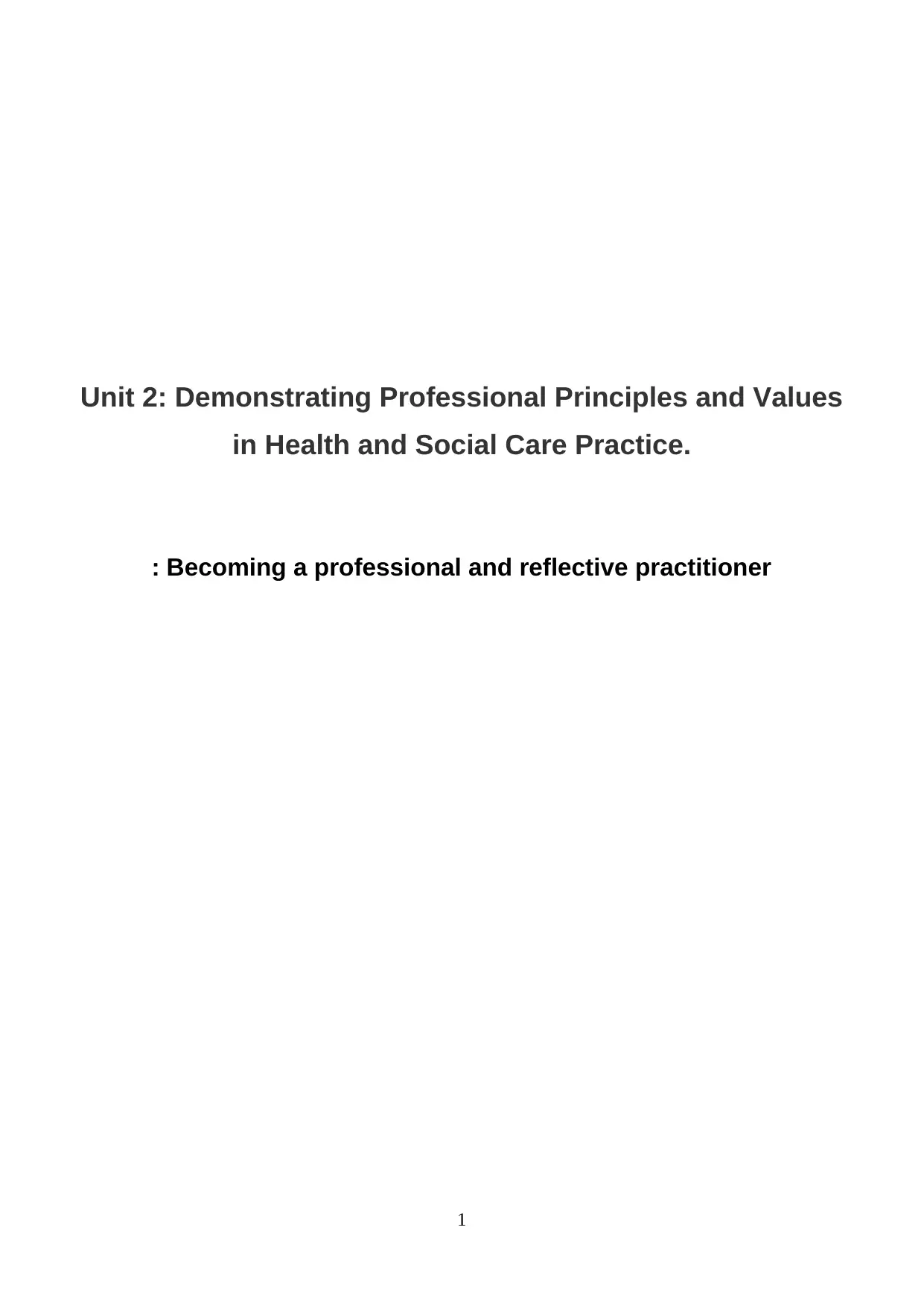
Unit 2: Demonstrating Professional Principles and Values
in Health and Social Care Practice.
: Becoming a professional and reflective practitioner
1
in Health and Social Care Practice.
: Becoming a professional and reflective practitioner
1
Paraphrase This Document
Need a fresh take? Get an instant paraphrase of this document with our AI Paraphraser
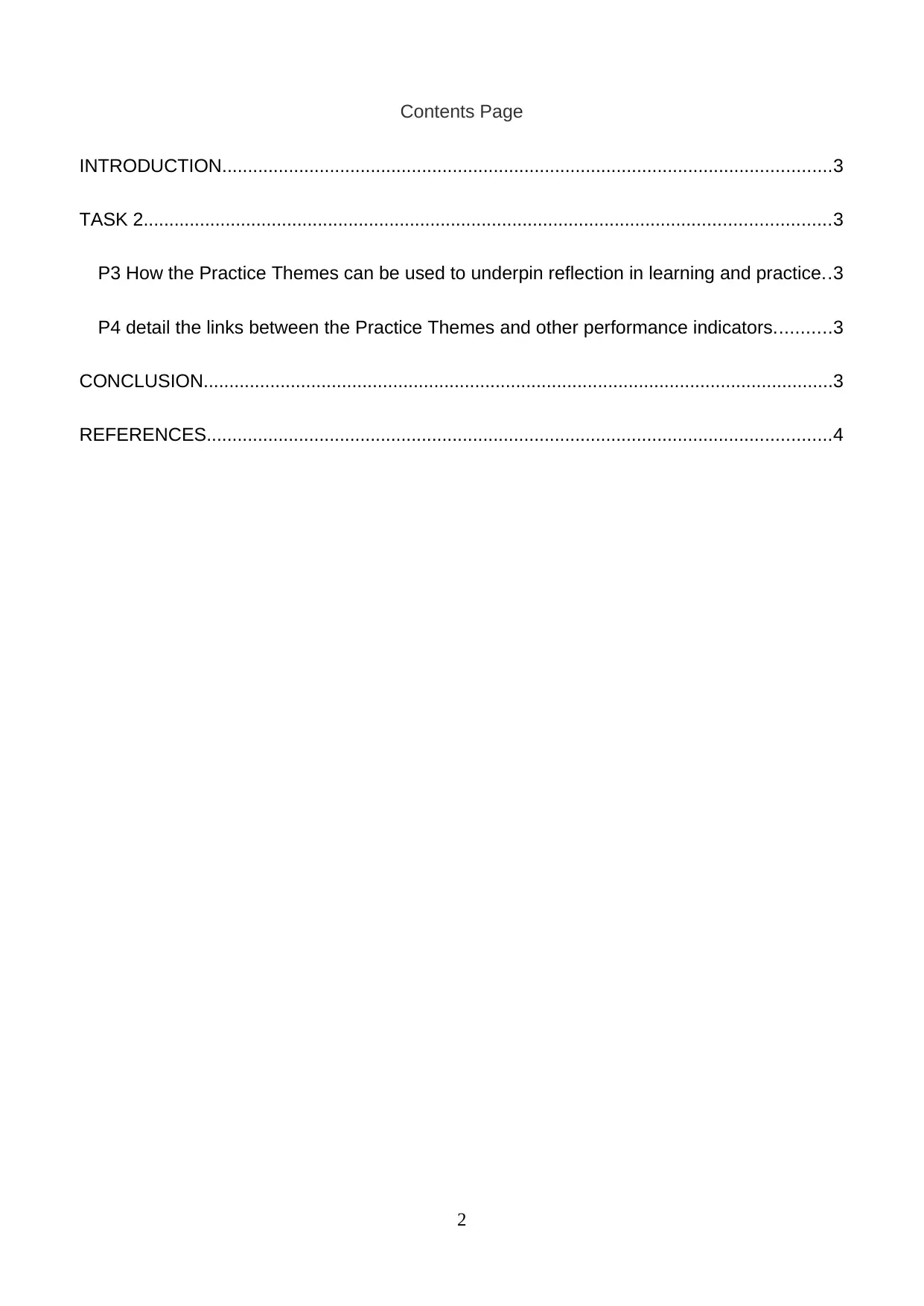
Contents Page
INTRODUCTION.......................................................................................................................3
TASK 2......................................................................................................................................3
P3 How the Practice Themes can be used to underpin reflection in learning and practice..3
P4 detail the links between the Practice Themes and other performance indicators...........3
CONCLUSION...........................................................................................................................3
REFERENCES..........................................................................................................................4
2
INTRODUCTION.......................................................................................................................3
TASK 2......................................................................................................................................3
P3 How the Practice Themes can be used to underpin reflection in learning and practice..3
P4 detail the links between the Practice Themes and other performance indicators...........3
CONCLUSION...........................................................................................................................3
REFERENCES..........................................................................................................................4
2
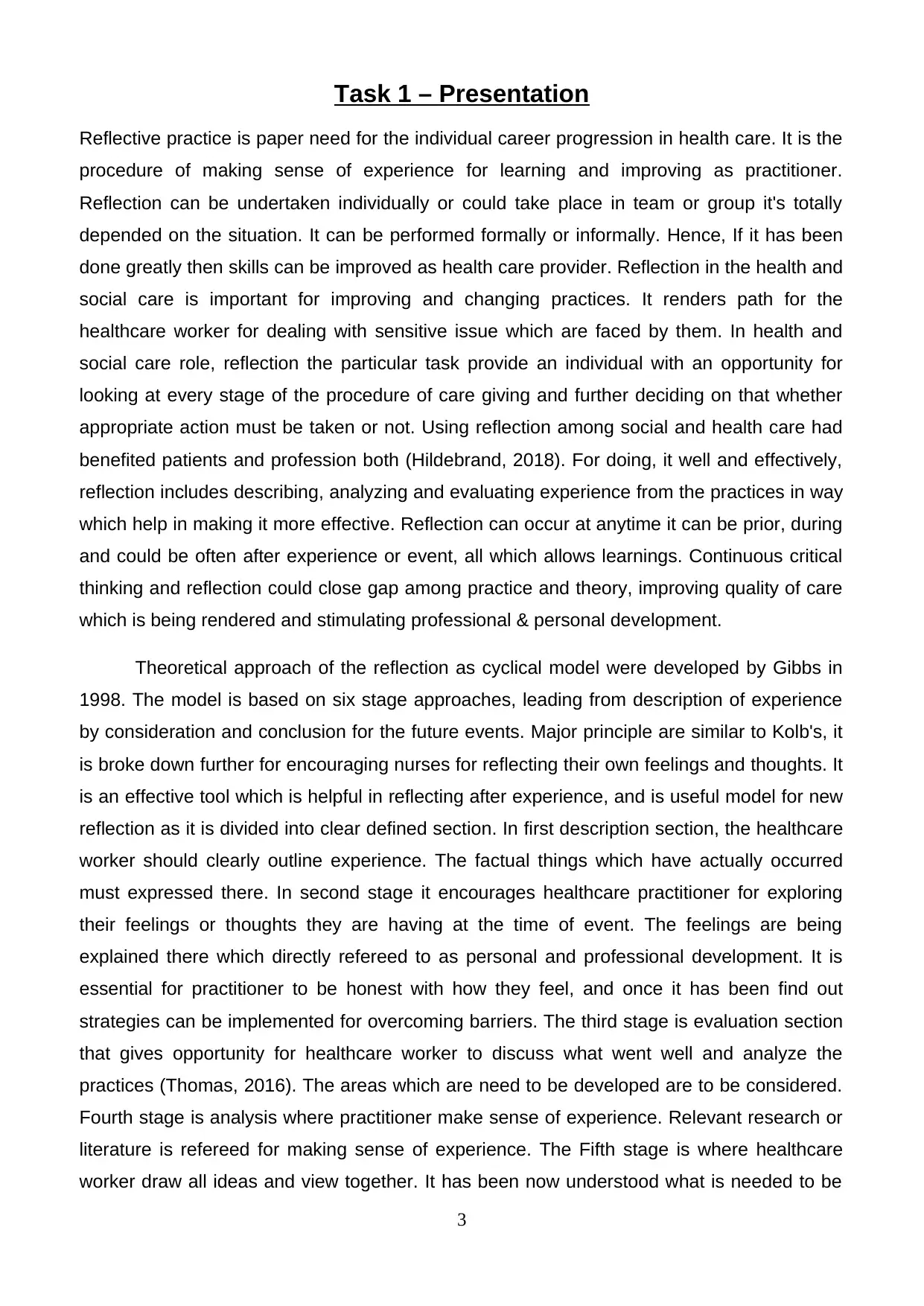
Task 1 – Presentation
Reflective practice is paper need for the individual career progression in health care. It is the
procedure of making sense of experience for learning and improving as practitioner.
Reflection can be undertaken individually or could take place in team or group it's totally
depended on the situation. It can be performed formally or informally. Hence, If it has been
done greatly then skills can be improved as health care provider. Reflection in the health and
social care is important for improving and changing practices. It renders path for the
healthcare worker for dealing with sensitive issue which are faced by them. In health and
social care role, reflection the particular task provide an individual with an opportunity for
looking at every stage of the procedure of care giving and further deciding on that whether
appropriate action must be taken or not. Using reflection among social and health care had
benefited patients and profession both (Hildebrand, 2018). For doing, it well and effectively,
reflection includes describing, analyzing and evaluating experience from the practices in way
which help in making it more effective. Reflection can occur at anytime it can be prior, during
and could be often after experience or event, all which allows learnings. Continuous critical
thinking and reflection could close gap among practice and theory, improving quality of care
which is being rendered and stimulating professional & personal development.
Theoretical approach of the reflection as cyclical model were developed by Gibbs in
1998. The model is based on six stage approaches, leading from description of experience
by consideration and conclusion for the future events. Major principle are similar to Kolb's, it
is broke down further for encouraging nurses for reflecting their own feelings and thoughts. It
is an effective tool which is helpful in reflecting after experience, and is useful model for new
reflection as it is divided into clear defined section. In first description section, the healthcare
worker should clearly outline experience. The factual things which have actually occurred
must expressed there. In second stage it encourages healthcare practitioner for exploring
their feelings or thoughts they are having at the time of event. The feelings are being
explained there which directly refereed to as personal and professional development. It is
essential for practitioner to be honest with how they feel, and once it has been find out
strategies can be implemented for overcoming barriers. The third stage is evaluation section
that gives opportunity for healthcare worker to discuss what went well and analyze the
practices (Thomas, 2016). The areas which are need to be developed are to be considered.
Fourth stage is analysis where practitioner make sense of experience. Relevant research or
literature is refereed for making sense of experience. The Fifth stage is where healthcare
worker draw all ideas and view together. It has been now understood what is needed to be
3
Reflective practice is paper need for the individual career progression in health care. It is the
procedure of making sense of experience for learning and improving as practitioner.
Reflection can be undertaken individually or could take place in team or group it's totally
depended on the situation. It can be performed formally or informally. Hence, If it has been
done greatly then skills can be improved as health care provider. Reflection in the health and
social care is important for improving and changing practices. It renders path for the
healthcare worker for dealing with sensitive issue which are faced by them. In health and
social care role, reflection the particular task provide an individual with an opportunity for
looking at every stage of the procedure of care giving and further deciding on that whether
appropriate action must be taken or not. Using reflection among social and health care had
benefited patients and profession both (Hildebrand, 2018). For doing, it well and effectively,
reflection includes describing, analyzing and evaluating experience from the practices in way
which help in making it more effective. Reflection can occur at anytime it can be prior, during
and could be often after experience or event, all which allows learnings. Continuous critical
thinking and reflection could close gap among practice and theory, improving quality of care
which is being rendered and stimulating professional & personal development.
Theoretical approach of the reflection as cyclical model were developed by Gibbs in
1998. The model is based on six stage approaches, leading from description of experience
by consideration and conclusion for the future events. Major principle are similar to Kolb's, it
is broke down further for encouraging nurses for reflecting their own feelings and thoughts. It
is an effective tool which is helpful in reflecting after experience, and is useful model for new
reflection as it is divided into clear defined section. In first description section, the healthcare
worker should clearly outline experience. The factual things which have actually occurred
must expressed there. In second stage it encourages healthcare practitioner for exploring
their feelings or thoughts they are having at the time of event. The feelings are being
explained there which directly refereed to as personal and professional development. It is
essential for practitioner to be honest with how they feel, and once it has been find out
strategies can be implemented for overcoming barriers. The third stage is evaluation section
that gives opportunity for healthcare worker to discuss what went well and analyze the
practices (Thomas, 2016). The areas which are need to be developed are to be considered.
Fourth stage is analysis where practitioner make sense of experience. Relevant research or
literature is refereed for making sense of experience. The Fifth stage is where healthcare
worker draw all ideas and view together. It has been now understood what is needed to be
3
⊘ This is a preview!⊘
Do you want full access?
Subscribe today to unlock all pages.

Trusted by 1+ million students worldwide
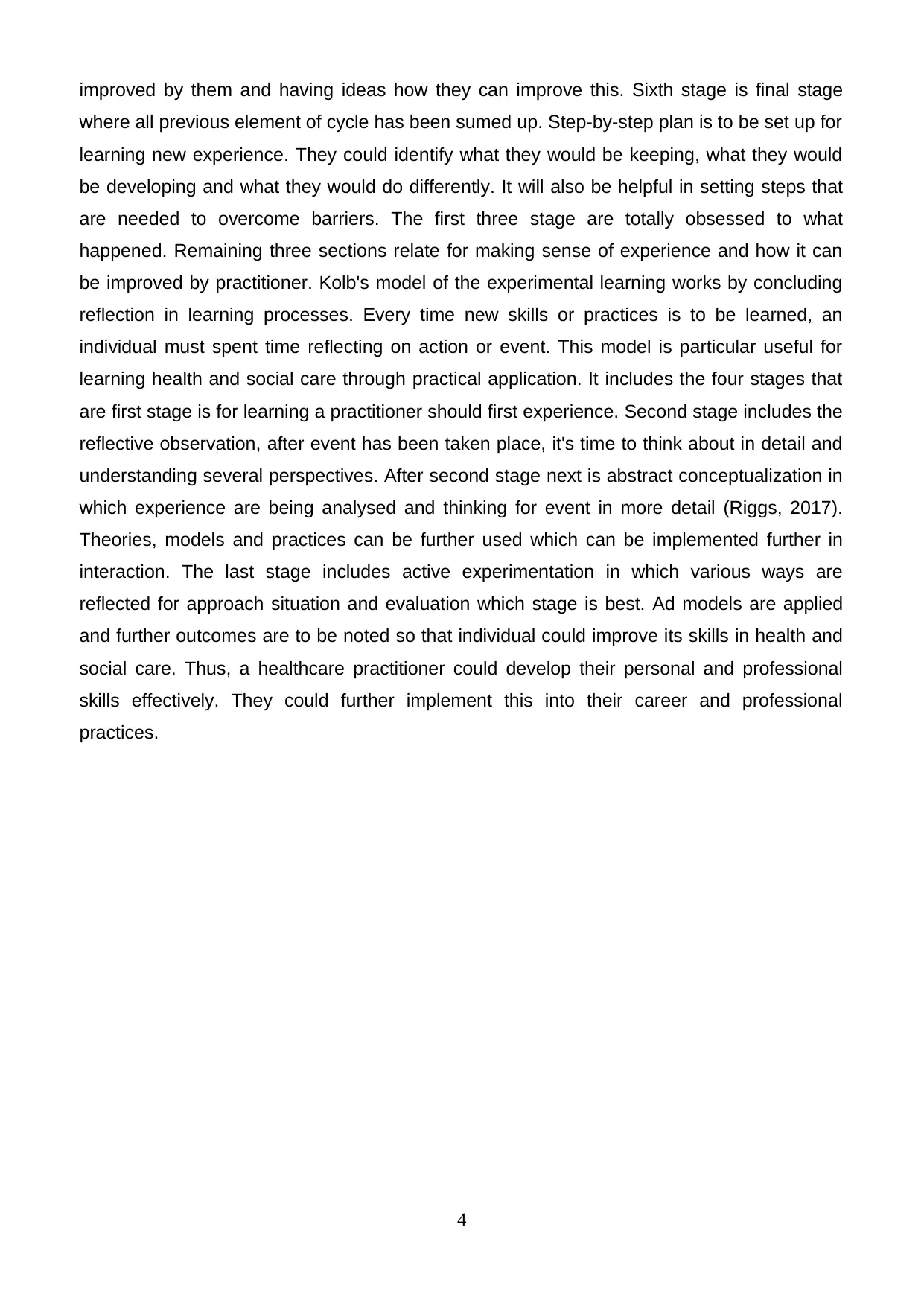
improved by them and having ideas how they can improve this. Sixth stage is final stage
where all previous element of cycle has been sumed up. Step-by-step plan is to be set up for
learning new experience. They could identify what they would be keeping, what they would
be developing and what they would do differently. It will also be helpful in setting steps that
are needed to overcome barriers. The first three stage are totally obsessed to what
happened. Remaining three sections relate for making sense of experience and how it can
be improved by practitioner. Kolb's model of the experimental learning works by concluding
reflection in learning processes. Every time new skills or practices is to be learned, an
individual must spent time reflecting on action or event. This model is particular useful for
learning health and social care through practical application. It includes the four stages that
are first stage is for learning a practitioner should first experience. Second stage includes the
reflective observation, after event has been taken place, it's time to think about in detail and
understanding several perspectives. After second stage next is abstract conceptualization in
which experience are being analysed and thinking for event in more detail (Riggs, 2017).
Theories, models and practices can be further used which can be implemented further in
interaction. The last stage includes active experimentation in which various ways are
reflected for approach situation and evaluation which stage is best. Ad models are applied
and further outcomes are to be noted so that individual could improve its skills in health and
social care. Thus, a healthcare practitioner could develop their personal and professional
skills effectively. They could further implement this into their career and professional
practices.
4
where all previous element of cycle has been sumed up. Step-by-step plan is to be set up for
learning new experience. They could identify what they would be keeping, what they would
be developing and what they would do differently. It will also be helpful in setting steps that
are needed to overcome barriers. The first three stage are totally obsessed to what
happened. Remaining three sections relate for making sense of experience and how it can
be improved by practitioner. Kolb's model of the experimental learning works by concluding
reflection in learning processes. Every time new skills or practices is to be learned, an
individual must spent time reflecting on action or event. This model is particular useful for
learning health and social care through practical application. It includes the four stages that
are first stage is for learning a practitioner should first experience. Second stage includes the
reflective observation, after event has been taken place, it's time to think about in detail and
understanding several perspectives. After second stage next is abstract conceptualization in
which experience are being analysed and thinking for event in more detail (Riggs, 2017).
Theories, models and practices can be further used which can be implemented further in
interaction. The last stage includes active experimentation in which various ways are
reflected for approach situation and evaluation which stage is best. Ad models are applied
and further outcomes are to be noted so that individual could improve its skills in health and
social care. Thus, a healthcare practitioner could develop their personal and professional
skills effectively. They could further implement this into their career and professional
practices.
4
Paraphrase This Document
Need a fresh take? Get an instant paraphrase of this document with our AI Paraphraser
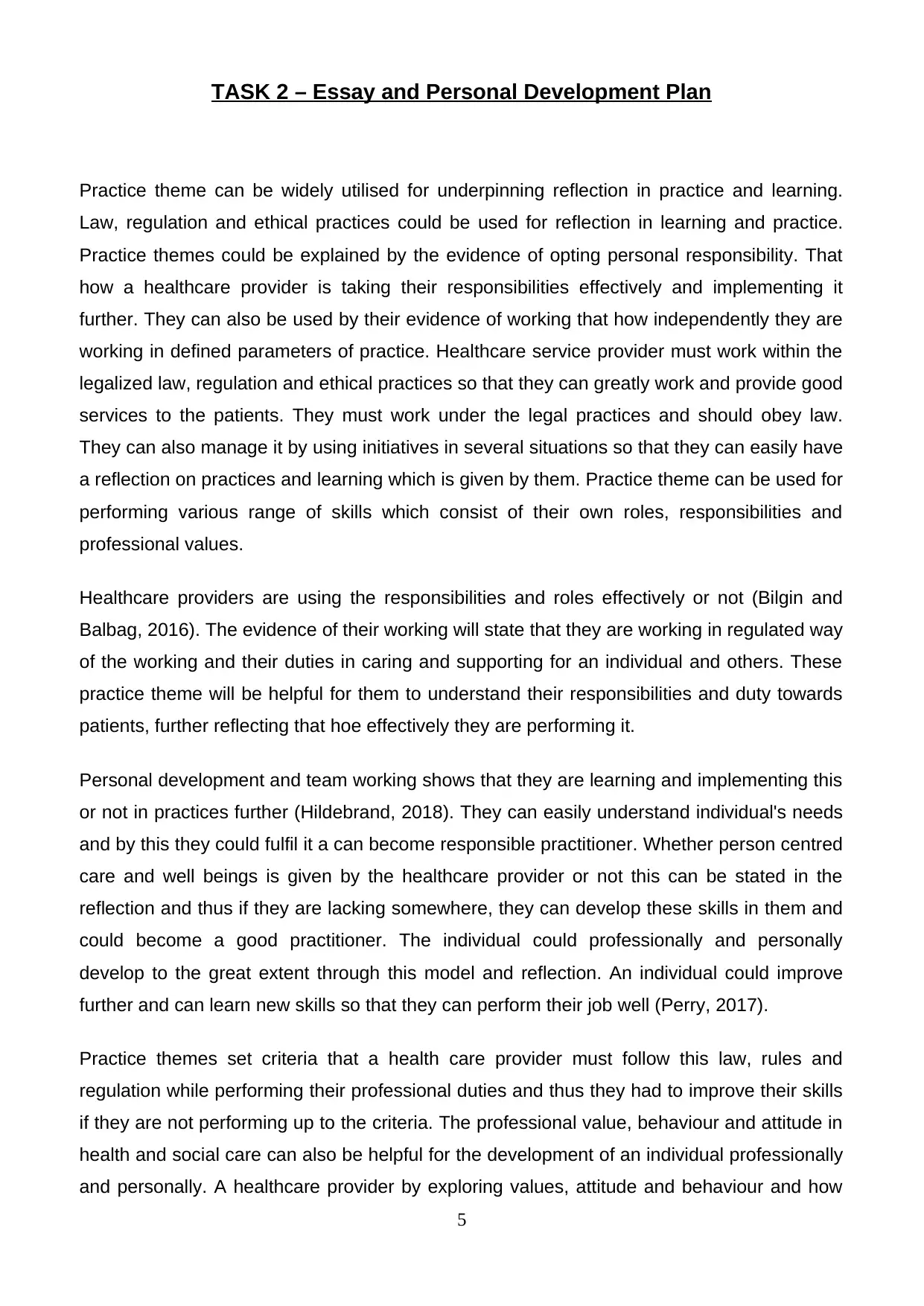
TASK 2 – Essay and Personal Development Plan
Practice theme can be widely utilised for underpinning reflection in practice and learning.
Law, regulation and ethical practices could be used for reflection in learning and practice.
Practice themes could be explained by the evidence of opting personal responsibility. That
how a healthcare provider is taking their responsibilities effectively and implementing it
further. They can also be used by their evidence of working that how independently they are
working in defined parameters of practice. Healthcare service provider must work within the
legalized law, regulation and ethical practices so that they can greatly work and provide good
services to the patients. They must work under the legal practices and should obey law.
They can also manage it by using initiatives in several situations so that they can easily have
a reflection on practices and learning which is given by them. Practice theme can be used for
performing various range of skills which consist of their own roles, responsibilities and
professional values.
Healthcare providers are using the responsibilities and roles effectively or not (Bilgin and
Balbag, 2016). The evidence of their working will state that they are working in regulated way
of the working and their duties in caring and supporting for an individual and others. These
practice theme will be helpful for them to understand their responsibilities and duty towards
patients, further reflecting that hoe effectively they are performing it.
Personal development and team working shows that they are learning and implementing this
or not in practices further (Hildebrand, 2018). They can easily understand individual's needs
and by this they could fulfil it a can become responsible practitioner. Whether person centred
care and well beings is given by the healthcare provider or not this can be stated in the
reflection and thus if they are lacking somewhere, they can develop these skills in them and
could become a good practitioner. The individual could professionally and personally
develop to the great extent through this model and reflection. An individual could improve
further and can learn new skills so that they can perform their job well (Perry, 2017).
Practice themes set criteria that a health care provider must follow this law, rules and
regulation while performing their professional duties and thus they had to improve their skills
if they are not performing up to the criteria. The professional value, behaviour and attitude in
health and social care can also be helpful for the development of an individual professionally
and personally. A healthcare provider by exploring values, attitude and behaviour and how
5
Practice theme can be widely utilised for underpinning reflection in practice and learning.
Law, regulation and ethical practices could be used for reflection in learning and practice.
Practice themes could be explained by the evidence of opting personal responsibility. That
how a healthcare provider is taking their responsibilities effectively and implementing it
further. They can also be used by their evidence of working that how independently they are
working in defined parameters of practice. Healthcare service provider must work within the
legalized law, regulation and ethical practices so that they can greatly work and provide good
services to the patients. They must work under the legal practices and should obey law.
They can also manage it by using initiatives in several situations so that they can easily have
a reflection on practices and learning which is given by them. Practice theme can be used for
performing various range of skills which consist of their own roles, responsibilities and
professional values.
Healthcare providers are using the responsibilities and roles effectively or not (Bilgin and
Balbag, 2016). The evidence of their working will state that they are working in regulated way
of the working and their duties in caring and supporting for an individual and others. These
practice theme will be helpful for them to understand their responsibilities and duty towards
patients, further reflecting that hoe effectively they are performing it.
Personal development and team working shows that they are learning and implementing this
or not in practices further (Hildebrand, 2018). They can easily understand individual's needs
and by this they could fulfil it a can become responsible practitioner. Whether person centred
care and well beings is given by the healthcare provider or not this can be stated in the
reflection and thus if they are lacking somewhere, they can develop these skills in them and
could become a good practitioner. The individual could professionally and personally
develop to the great extent through this model and reflection. An individual could improve
further and can learn new skills so that they can perform their job well (Perry, 2017).
Practice themes set criteria that a health care provider must follow this law, rules and
regulation while performing their professional duties and thus they had to improve their skills
if they are not performing up to the criteria. The professional value, behaviour and attitude in
health and social care can also be helpful for the development of an individual professionally
and personally. A healthcare provider by exploring values, attitude and behaviour and how
5
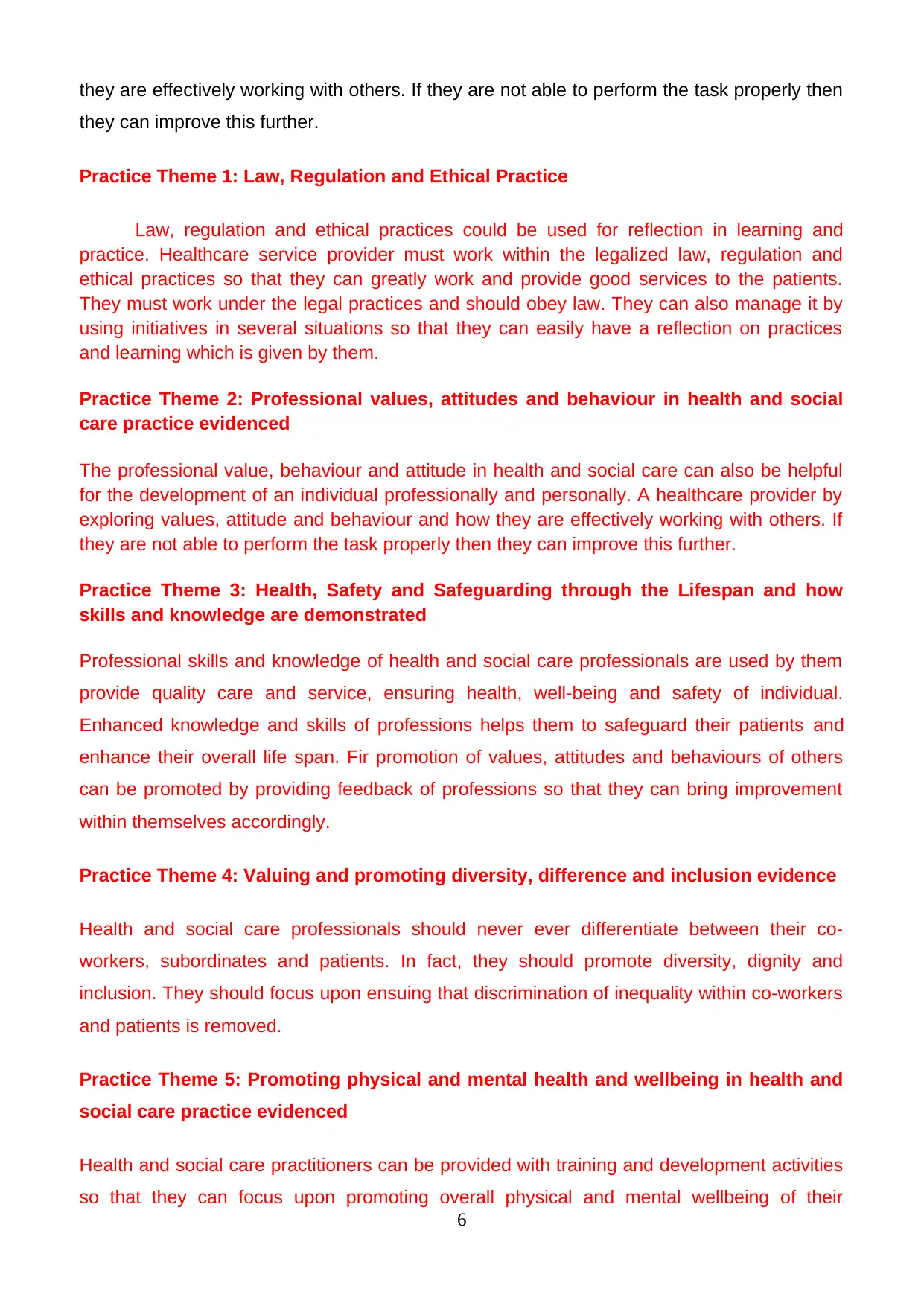
they are effectively working with others. If they are not able to perform the task properly then
they can improve this further.
Practice Theme 1: Law, Regulation and Ethical Practice
Law, regulation and ethical practices could be used for reflection in learning and
practice. Healthcare service provider must work within the legalized law, regulation and
ethical practices so that they can greatly work and provide good services to the patients.
They must work under the legal practices and should obey law. They can also manage it by
using initiatives in several situations so that they can easily have a reflection on practices
and learning which is given by them.
Practice Theme 2: Professional values, attitudes and behaviour in health and social
care practice evidenced
The professional value, behaviour and attitude in health and social care can also be helpful
for the development of an individual professionally and personally. A healthcare provider by
exploring values, attitude and behaviour and how they are effectively working with others. If
they are not able to perform the task properly then they can improve this further.
Practice Theme 3: Health, Safety and Safeguarding through the Lifespan and how
skills and knowledge are demonstrated
Professional skills and knowledge of health and social care professionals are used by them
provide quality care and service, ensuring health, well-being and safety of individual.
Enhanced knowledge and skills of professions helps them to safeguard their patients and
enhance their overall life span. Fir promotion of values, attitudes and behaviours of others
can be promoted by providing feedback of professions so that they can bring improvement
within themselves accordingly.
Practice Theme 4: Valuing and promoting diversity, difference and inclusion evidence
Health and social care professionals should never ever differentiate between their co-
workers, subordinates and patients. In fact, they should promote diversity, dignity and
inclusion. They should focus upon ensuing that discrimination of inequality within co-workers
and patients is removed.
Practice Theme 5: Promoting physical and mental health and wellbeing in health and
social care practice evidenced
Health and social care practitioners can be provided with training and development activities
so that they can focus upon promoting overall physical and mental wellbeing of their
6
they can improve this further.
Practice Theme 1: Law, Regulation and Ethical Practice
Law, regulation and ethical practices could be used for reflection in learning and
practice. Healthcare service provider must work within the legalized law, regulation and
ethical practices so that they can greatly work and provide good services to the patients.
They must work under the legal practices and should obey law. They can also manage it by
using initiatives in several situations so that they can easily have a reflection on practices
and learning which is given by them.
Practice Theme 2: Professional values, attitudes and behaviour in health and social
care practice evidenced
The professional value, behaviour and attitude in health and social care can also be helpful
for the development of an individual professionally and personally. A healthcare provider by
exploring values, attitude and behaviour and how they are effectively working with others. If
they are not able to perform the task properly then they can improve this further.
Practice Theme 3: Health, Safety and Safeguarding through the Lifespan and how
skills and knowledge are demonstrated
Professional skills and knowledge of health and social care professionals are used by them
provide quality care and service, ensuring health, well-being and safety of individual.
Enhanced knowledge and skills of professions helps them to safeguard their patients and
enhance their overall life span. Fir promotion of values, attitudes and behaviours of others
can be promoted by providing feedback of professions so that they can bring improvement
within themselves accordingly.
Practice Theme 4: Valuing and promoting diversity, difference and inclusion evidence
Health and social care professionals should never ever differentiate between their co-
workers, subordinates and patients. In fact, they should promote diversity, dignity and
inclusion. They should focus upon ensuing that discrimination of inequality within co-workers
and patients is removed.
Practice Theme 5: Promoting physical and mental health and wellbeing in health and
social care practice evidenced
Health and social care practitioners can be provided with training and development activities
so that they can focus upon promoting overall physical and mental wellbeing of their
6
⊘ This is a preview!⊘
Do you want full access?
Subscribe today to unlock all pages.

Trusted by 1+ million students worldwide
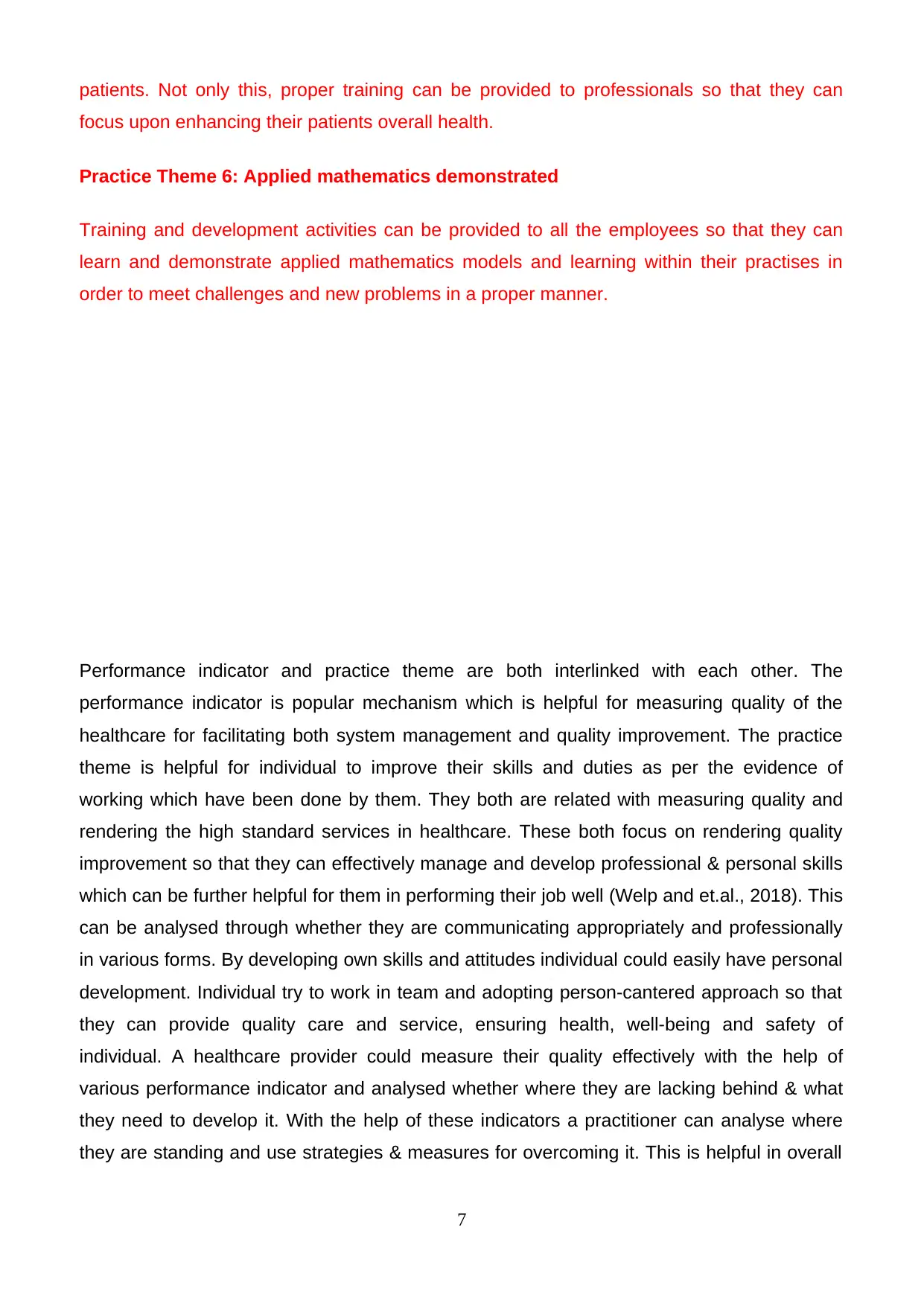
patients. Not only this, proper training can be provided to professionals so that they can
focus upon enhancing their patients overall health.
Practice Theme 6: Applied mathematics demonstrated
Training and development activities can be provided to all the employees so that they can
learn and demonstrate applied mathematics models and learning within their practises in
order to meet challenges and new problems in a proper manner.
Performance indicator and practice theme are both interlinked with each other. The
performance indicator is popular mechanism which is helpful for measuring quality of the
healthcare for facilitating both system management and quality improvement. The practice
theme is helpful for individual to improve their skills and duties as per the evidence of
working which have been done by them. They both are related with measuring quality and
rendering the high standard services in healthcare. These both focus on rendering quality
improvement so that they can effectively manage and develop professional & personal skills
which can be further helpful for them in performing their job well (Welp and et.al., 2018). This
can be analysed through whether they are communicating appropriately and professionally
in various forms. By developing own skills and attitudes individual could easily have personal
development. Individual try to work in team and adopting person-cantered approach so that
they can provide quality care and service, ensuring health, well-being and safety of
individual. A healthcare provider could measure their quality effectively with the help of
various performance indicator and analysed whether where they are lacking behind & what
they need to develop it. With the help of these indicators a practitioner can analyse where
they are standing and use strategies & measures for overcoming it. This is helpful in overall
7
focus upon enhancing their patients overall health.
Practice Theme 6: Applied mathematics demonstrated
Training and development activities can be provided to all the employees so that they can
learn and demonstrate applied mathematics models and learning within their practises in
order to meet challenges and new problems in a proper manner.
Performance indicator and practice theme are both interlinked with each other. The
performance indicator is popular mechanism which is helpful for measuring quality of the
healthcare for facilitating both system management and quality improvement. The practice
theme is helpful for individual to improve their skills and duties as per the evidence of
working which have been done by them. They both are related with measuring quality and
rendering the high standard services in healthcare. These both focus on rendering quality
improvement so that they can effectively manage and develop professional & personal skills
which can be further helpful for them in performing their job well (Welp and et.al., 2018). This
can be analysed through whether they are communicating appropriately and professionally
in various forms. By developing own skills and attitudes individual could easily have personal
development. Individual try to work in team and adopting person-cantered approach so that
they can provide quality care and service, ensuring health, well-being and safety of
individual. A healthcare provider could measure their quality effectively with the help of
various performance indicator and analysed whether where they are lacking behind & what
they need to develop it. With the help of these indicators a practitioner can analyse where
they are standing and use strategies & measures for overcoming it. This is helpful in overall
7
Paraphrase This Document
Need a fresh take? Get an instant paraphrase of this document with our AI Paraphraser
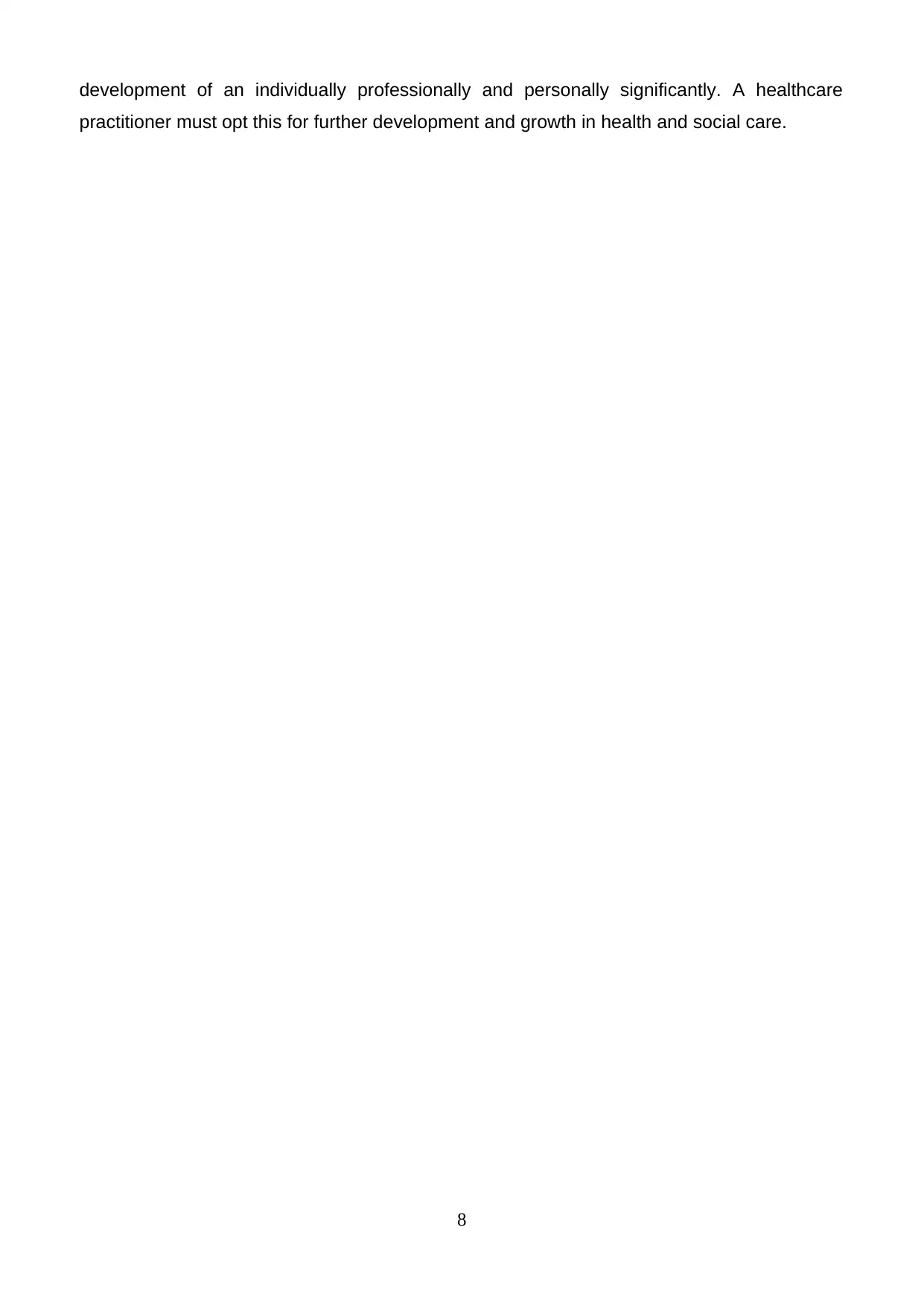
development of an individually professionally and personally significantly. A healthcare
practitioner must opt this for further development and growth in health and social care.
8
practitioner must opt this for further development and growth in health and social care.
8
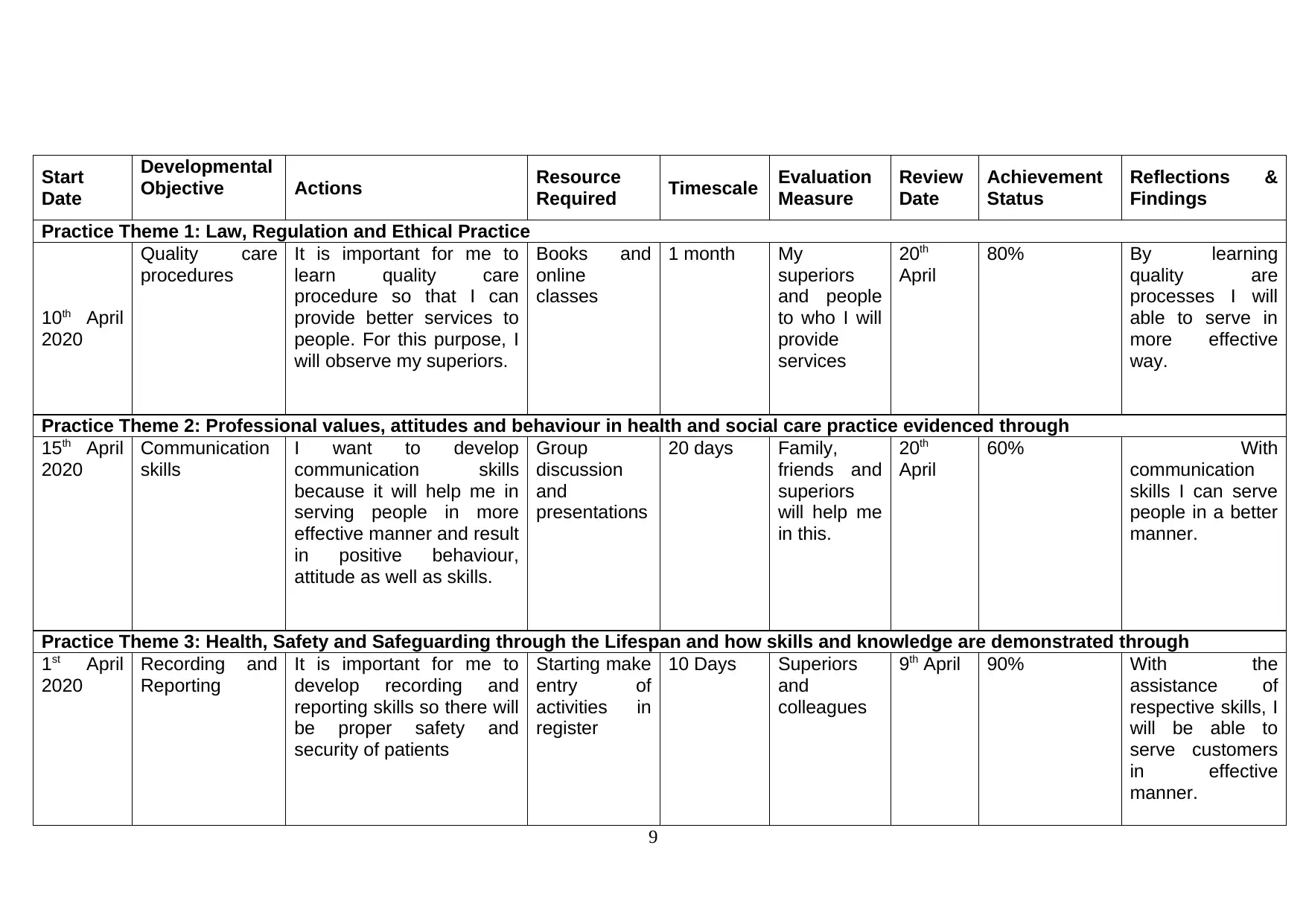
Start
Date
Developmental
Objective Actions Resource
Required Timescale Evaluation
Measure
Review
Date
Achievement
Status
Reflections &
Findings
Practice Theme 1: Law, Regulation and Ethical Practice
10th April
2020
Quality care
procedures
It is important for me to
learn quality care
procedure so that I can
provide better services to
people. For this purpose, I
will observe my superiors.
Books and
online
classes
1 month My
superiors
and people
to who I will
provide
services
20th
April
80% By learning
quality are
processes I will
able to serve in
more effective
way.
Practice Theme 2: Professional values, attitudes and behaviour in health and social care practice evidenced through
15th April
2020
Communication
skills
I want to develop
communication skills
because it will help me in
serving people in more
effective manner and result
in positive behaviour,
attitude as well as skills.
Group
discussion
and
presentations
20 days Family,
friends and
superiors
will help me
in this.
20th
April
60% With
communication
skills I can serve
people in a better
manner.
Practice Theme 3: Health, Safety and Safeguarding through the Lifespan and how skills and knowledge are demonstrated through
1st April
2020
Recording and
Reporting
It is important for me to
develop recording and
reporting skills so there will
be proper safety and
security of patients
Starting make
entry of
activities in
register
10 Days Superiors
and
colleagues
9th April 90% With the
assistance of
respective skills, I
will be able to
serve customers
in effective
manner.
9
Date
Developmental
Objective Actions Resource
Required Timescale Evaluation
Measure
Review
Date
Achievement
Status
Reflections &
Findings
Practice Theme 1: Law, Regulation and Ethical Practice
10th April
2020
Quality care
procedures
It is important for me to
learn quality care
procedure so that I can
provide better services to
people. For this purpose, I
will observe my superiors.
Books and
online
classes
1 month My
superiors
and people
to who I will
provide
services
20th
April
80% By learning
quality are
processes I will
able to serve in
more effective
way.
Practice Theme 2: Professional values, attitudes and behaviour in health and social care practice evidenced through
15th April
2020
Communication
skills
I want to develop
communication skills
because it will help me in
serving people in more
effective manner and result
in positive behaviour,
attitude as well as skills.
Group
discussion
and
presentations
20 days Family,
friends and
superiors
will help me
in this.
20th
April
60% With
communication
skills I can serve
people in a better
manner.
Practice Theme 3: Health, Safety and Safeguarding through the Lifespan and how skills and knowledge are demonstrated through
1st April
2020
Recording and
Reporting
It is important for me to
develop recording and
reporting skills so there will
be proper safety and
security of patients
Starting make
entry of
activities in
register
10 Days Superiors
and
colleagues
9th April 90% With the
assistance of
respective skills, I
will be able to
serve customers
in effective
manner.
9
⊘ This is a preview!⊘
Do you want full access?
Subscribe today to unlock all pages.

Trusted by 1+ million students worldwide
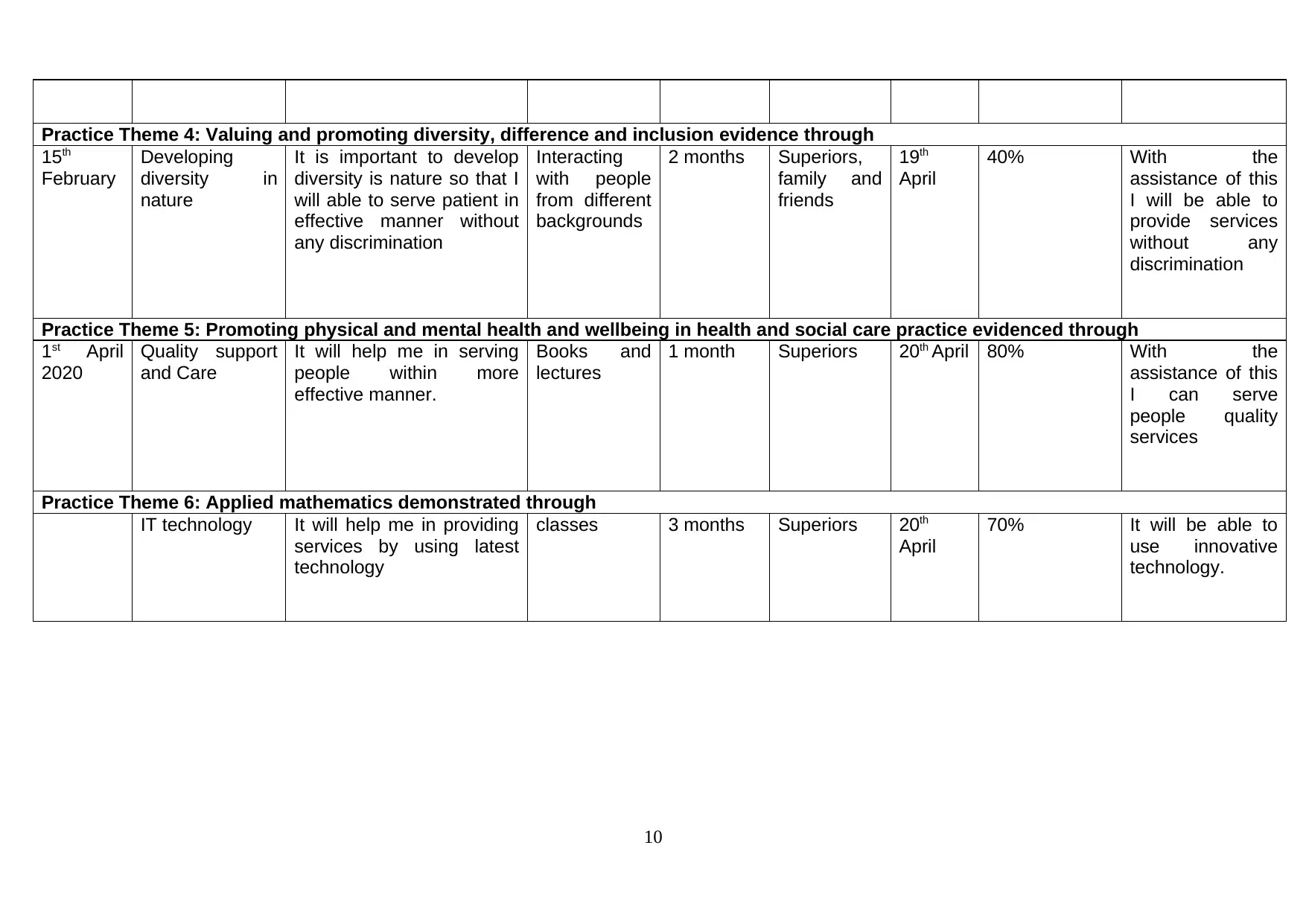
Practice Theme 4: Valuing and promoting diversity, difference and inclusion evidence through
15th
February
Developing
diversity in
nature
It is important to develop
diversity is nature so that I
will able to serve patient in
effective manner without
any discrimination
Interacting
with people
from different
backgrounds
2 months Superiors,
family and
friends
19th
April
40% With the
assistance of this
I will be able to
provide services
without any
discrimination
Practice Theme 5: Promoting physical and mental health and wellbeing in health and social care practice evidenced through
1st April
2020
Quality support
and Care
It will help me in serving
people within more
effective manner.
Books and
lectures
1 month Superiors 20th April 80% With the
assistance of this
I can serve
people quality
services
Practice Theme 6: Applied mathematics demonstrated through
IT technology It will help me in providing
services by using latest
technology
classes 3 months Superiors 20th
April
70% It will be able to
use innovative
technology.
10
15th
February
Developing
diversity in
nature
It is important to develop
diversity is nature so that I
will able to serve patient in
effective manner without
any discrimination
Interacting
with people
from different
backgrounds
2 months Superiors,
family and
friends
19th
April
40% With the
assistance of this
I will be able to
provide services
without any
discrimination
Practice Theme 5: Promoting physical and mental health and wellbeing in health and social care practice evidenced through
1st April
2020
Quality support
and Care
It will help me in serving
people within more
effective manner.
Books and
lectures
1 month Superiors 20th April 80% With the
assistance of this
I can serve
people quality
services
Practice Theme 6: Applied mathematics demonstrated through
IT technology It will help me in providing
services by using latest
technology
classes 3 months Superiors 20th
April
70% It will be able to
use innovative
technology.
10
Paraphrase This Document
Need a fresh take? Get an instant paraphrase of this document with our AI Paraphraser
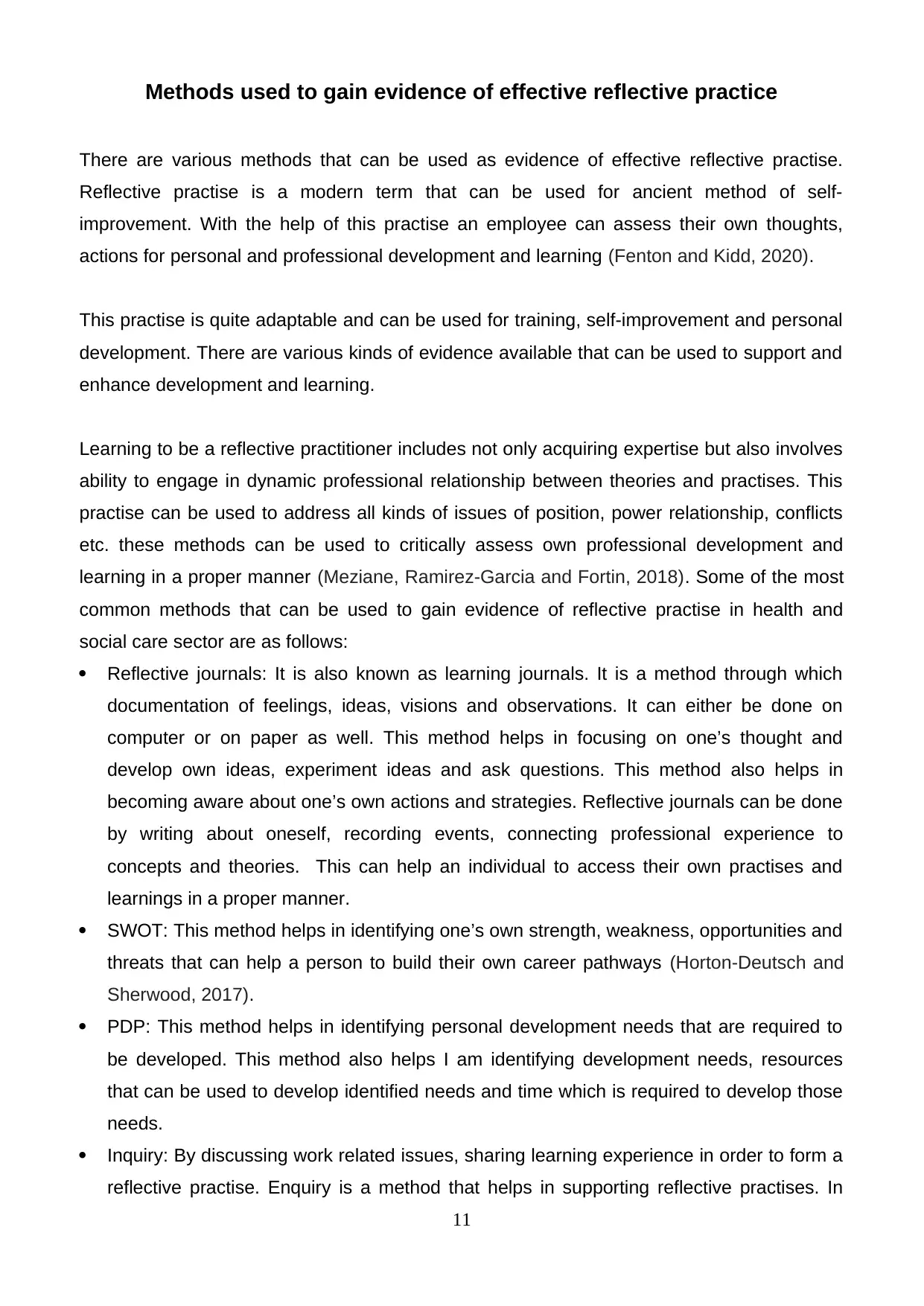
Methods used to gain evidence of effective reflective practice
There are various methods that can be used as evidence of effective reflective practise.
Reflective practise is a modern term that can be used for ancient method of self-
improvement. With the help of this practise an employee can assess their own thoughts,
actions for personal and professional development and learning (Fenton and Kidd, 2020).
This practise is quite adaptable and can be used for training, self-improvement and personal
development. There are various kinds of evidence available that can be used to support and
enhance development and learning.
Learning to be a reflective practitioner includes not only acquiring expertise but also involves
ability to engage in dynamic professional relationship between theories and practises. This
practise can be used to address all kinds of issues of position, power relationship, conflicts
etc. these methods can be used to critically assess own professional development and
learning in a proper manner (Meziane, Ramirez-Garcia and Fortin, 2018). Some of the most
common methods that can be used to gain evidence of reflective practise in health and
social care sector are as follows:
Reflective journals: It is also known as learning journals. It is a method through which
documentation of feelings, ideas, visions and observations. It can either be done on
computer or on paper as well. This method helps in focusing on one’s thought and
develop own ideas, experiment ideas and ask questions. This method also helps in
becoming aware about one’s own actions and strategies. Reflective journals can be done
by writing about oneself, recording events, connecting professional experience to
concepts and theories. This can help an individual to access their own practises and
learnings in a proper manner.
SWOT: This method helps in identifying one’s own strength, weakness, opportunities and
threats that can help a person to build their own career pathways (Horton-Deutsch and
Sherwood, 2017).
PDP: This method helps in identifying personal development needs that are required to
be developed. This method also helps I am identifying development needs, resources
that can be used to develop identified needs and time which is required to develop those
needs.
Inquiry: By discussing work related issues, sharing learning experience in order to form a
reflective practise. Enquiry is a method that helps in supporting reflective practises. In
11
There are various methods that can be used as evidence of effective reflective practise.
Reflective practise is a modern term that can be used for ancient method of self-
improvement. With the help of this practise an employee can assess their own thoughts,
actions for personal and professional development and learning (Fenton and Kidd, 2020).
This practise is quite adaptable and can be used for training, self-improvement and personal
development. There are various kinds of evidence available that can be used to support and
enhance development and learning.
Learning to be a reflective practitioner includes not only acquiring expertise but also involves
ability to engage in dynamic professional relationship between theories and practises. This
practise can be used to address all kinds of issues of position, power relationship, conflicts
etc. these methods can be used to critically assess own professional development and
learning in a proper manner (Meziane, Ramirez-Garcia and Fortin, 2018). Some of the most
common methods that can be used to gain evidence of reflective practise in health and
social care sector are as follows:
Reflective journals: It is also known as learning journals. It is a method through which
documentation of feelings, ideas, visions and observations. It can either be done on
computer or on paper as well. This method helps in focusing on one’s thought and
develop own ideas, experiment ideas and ask questions. This method also helps in
becoming aware about one’s own actions and strategies. Reflective journals can be done
by writing about oneself, recording events, connecting professional experience to
concepts and theories. This can help an individual to access their own practises and
learnings in a proper manner.
SWOT: This method helps in identifying one’s own strength, weakness, opportunities and
threats that can help a person to build their own career pathways (Horton-Deutsch and
Sherwood, 2017).
PDP: This method helps in identifying personal development needs that are required to
be developed. This method also helps I am identifying development needs, resources
that can be used to develop identified needs and time which is required to develop those
needs.
Inquiry: By discussing work related issues, sharing learning experience in order to form a
reflective practise. Enquiry is a method that helps in supporting reflective practises. In
11
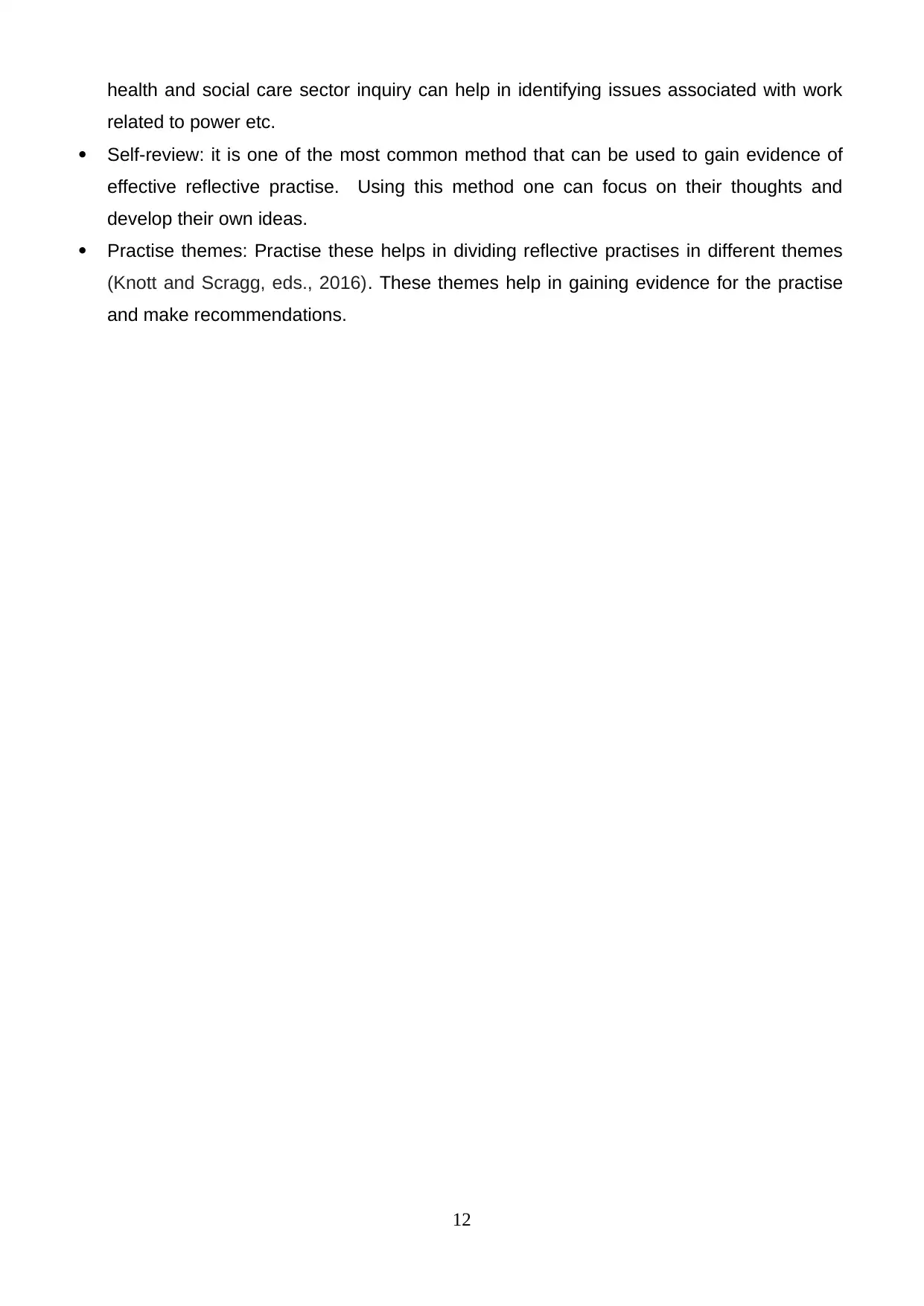
health and social care sector inquiry can help in identifying issues associated with work
related to power etc.
Self-review: it is one of the most common method that can be used to gain evidence of
effective reflective practise. Using this method one can focus on their thoughts and
develop their own ideas.
Practise themes: Practise these helps in dividing reflective practises in different themes
(Knott and Scragg, eds., 2016). These themes help in gaining evidence for the practise
and make recommendations.
12
related to power etc.
Self-review: it is one of the most common method that can be used to gain evidence of
effective reflective practise. Using this method one can focus on their thoughts and
develop their own ideas.
Practise themes: Practise these helps in dividing reflective practises in different themes
(Knott and Scragg, eds., 2016). These themes help in gaining evidence for the practise
and make recommendations.
12
⊘ This is a preview!⊘
Do you want full access?
Subscribe today to unlock all pages.

Trusted by 1+ million students worldwide
1 out of 23
Related Documents
Your All-in-One AI-Powered Toolkit for Academic Success.
+13062052269
info@desklib.com
Available 24*7 on WhatsApp / Email
![[object Object]](/_next/static/media/star-bottom.7253800d.svg)
Unlock your academic potential
Copyright © 2020–2026 A2Z Services. All Rights Reserved. Developed and managed by ZUCOL.





